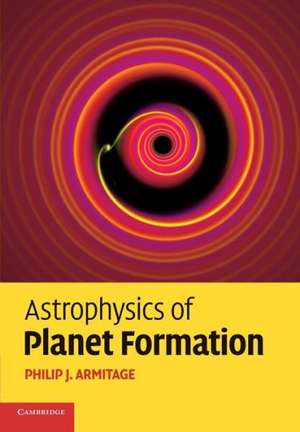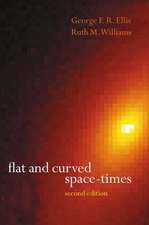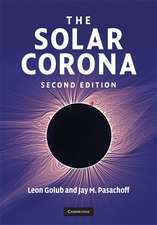Astrophysics of Planet Formation
Autor Philip J. Armitageen Limba Engleză Paperback – 23 oct 2013
| Toate formatele și edițiile | Preț | Express |
|---|---|---|
| Paperback (1) | 434.95 lei 38-45 zile | |
| Cambridge University Press – 23 oct 2013 | 434.95 lei 38-45 zile | |
| Hardback (2) | 477.24 lei 3-5 săpt. | +33.67 lei 6-12 zile |
| Cambridge University Press – 29 ian 2020 | 477.24 lei 3-5 săpt. | +33.67 lei 6-12 zile |
| Cambridge University Press – 9 dec 2009 | 616.67 lei 38-45 zile |
Preț: 434.95 lei
Nou
Puncte Express: 652
Preț estimativ în valută:
83.23€ • 88.100$ • 69.39£
83.23€ • 88.100$ • 69.39£
Carte tipărită la comandă
Livrare economică 14-21 aprilie
Preluare comenzi: 021 569.72.76
Specificații
ISBN-13: 9781107653085
ISBN-10: 1107653088
Pagini: 296
Dimensiuni: 170 x 244 x 16 mm
Greutate: 0.48 kg
Editura: Cambridge University Press
Colecția Cambridge University Press
Locul publicării:New York, United States
ISBN-10: 1107653088
Pagini: 296
Dimensiuni: 170 x 244 x 16 mm
Greutate: 0.48 kg
Editura: Cambridge University Press
Colecția Cambridge University Press
Locul publicării:New York, United States
Cuprins
Preface; 1. Observations of planetary systems; 2. Protoplanetary disk structure; 3. Protoplanetary disk evolution; 4. Planetesimal formation; 5. Terrestrial planet formation; 6. Giant planet formation; 7. Early evolution of planetary systems; Appendix 1: physical and astronomical constants; Appendix 2: N-body methods; References; Index.
Recenzii
'Eleven years after the publication of its first edition, Armitage revisits this graduate-level textbook on the astrophysics of planet formation to update it based on the trove of knowledge produced by the Kepler space telescope and ALMA that revolutionized our concept of what planetary systems look like. The book covers the structure and evolution of protoplanetary disks and the formation of planetesimals within them, the formation of rocky and giant planets, as well as the evolution of protoplanetary systems. The astrophysics is put into context by an introductory chapter on what observations are currently telling us.' Karouzos Marios, Nature Astronomy
'This book offers to the reader a comprehensive view of all main processes occurring during the planet formation. It serves the task of a perfect introductory book for any student willing to engage in this research topic. It is also an ideal reference to everyone teaching all stages of planet formation and a good support for anyone looking for an overview about physics and key processes of planet formation starting from disk phase. This edition includes most recent developments in the field and a useful suggestion of further reading at the end each chapter.' Didier Queloz, University of Cambridge
'Philip Armitage takes you on an engaging journey through the physical processes of planet formation, while providing both physical intuition and the necessary details and equations. Armitage renders a comprehensive picture of the physics behind the different stages of planetary systems' formation and evolution. He connects the current theoretical understandings with recent observations and highlights new and exciting developments in the field. Read this book and expand your knowledge.' Smadar Naoz, University of California, Los Angeles
'The end product is an absolutely first-class text-book. Armitage always has the needs of his students firmly in mind. His exposition is comprehensive, detailed, thorough, concise, and clear. This is coupled with the fact that the book is beautifully produced, and well-illustrated, and referenced. It will do much to encourage more scientists to move into this fascinating field.' David W. Hughes, The Observatory
'This work is a highly mathematical textbook, drawing on many subdisciplines in physics, chemistry, and geophysics, and designed to train specialists in this complex and rapidly evolving discipline … The field is rapidly changing, with continuing discoveries and theoretical advances, justifying this second edition, and no doubt future editions to come. The book is suitable for students and professionals who are well trained in orbital and fluid dynamics, with some knowledge of other pertinent fields including physical chemistry and magnetohydrodynamics.' S. P. Maran, Choice
'This book offers to the reader a comprehensive view of all main processes occurring during the planet formation. It serves the task of a perfect introductory book for any student willing to engage in this research topic. It is also an ideal reference to everyone teaching all stages of planet formation and a good support for anyone looking for an overview about physics and key processes of planet formation starting from disk phase. This edition includes most recent developments in the field and a useful suggestion of further reading at the end each chapter.' Didier Queloz, University of Cambridge
'Philip Armitage takes you on an engaging journey through the physical processes of planet formation, while providing both physical intuition and the necessary details and equations. Armitage renders a comprehensive picture of the physics behind the different stages of planetary systems' formation and evolution. He connects the current theoretical understandings with recent observations and highlights new and exciting developments in the field. Read this book and expand your knowledge.' Smadar Naoz, University of California, Los Angeles
'The end product is an absolutely first-class text-book. Armitage always has the needs of his students firmly in mind. His exposition is comprehensive, detailed, thorough, concise, and clear. This is coupled with the fact that the book is beautifully produced, and well-illustrated, and referenced. It will do much to encourage more scientists to move into this fascinating field.' David W. Hughes, The Observatory
'This work is a highly mathematical textbook, drawing on many subdisciplines in physics, chemistry, and geophysics, and designed to train specialists in this complex and rapidly evolving discipline … The field is rapidly changing, with continuing discoveries and theoretical advances, justifying this second edition, and no doubt future editions to come. The book is suitable for students and professionals who are well trained in orbital and fluid dynamics, with some knowledge of other pertinent fields including physical chemistry and magnetohydrodynamics.' S. P. Maran, Choice
Notă biografică
Philip J. Armitage is a Professor in the Department of Astrophysical and Planetary Sciences at the University of Colorado, Boulder, and a Fellow of JILA. His research focuses on theoretical and computational studies of protoplanetary disks, planet formation and black hole astrophysics. He has extensive teaching experience at the advanced undergraduate and graduate level.









